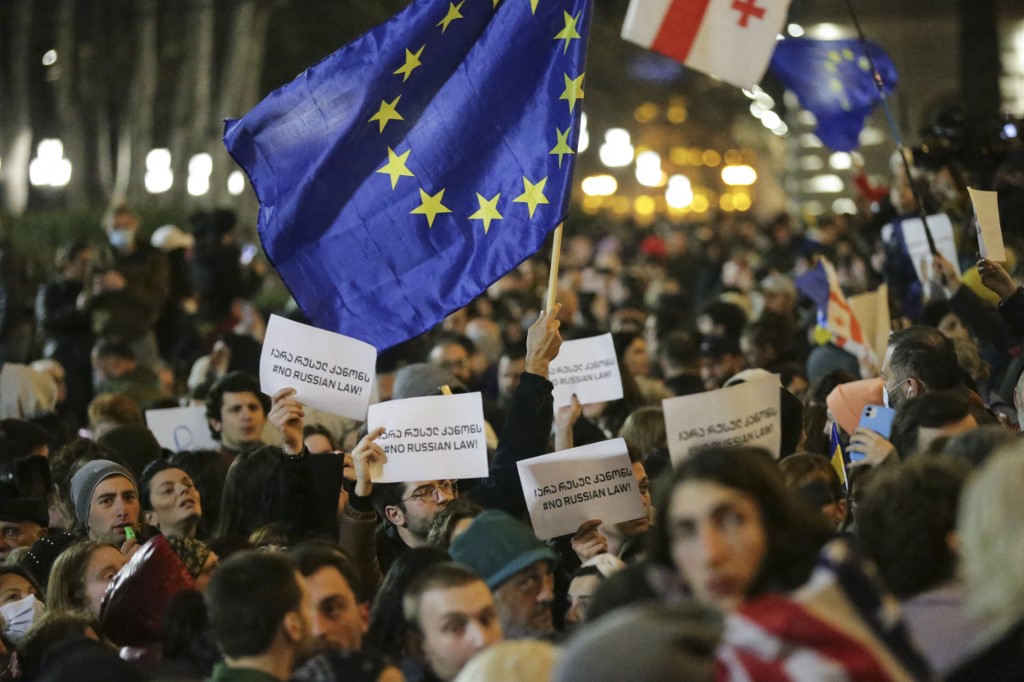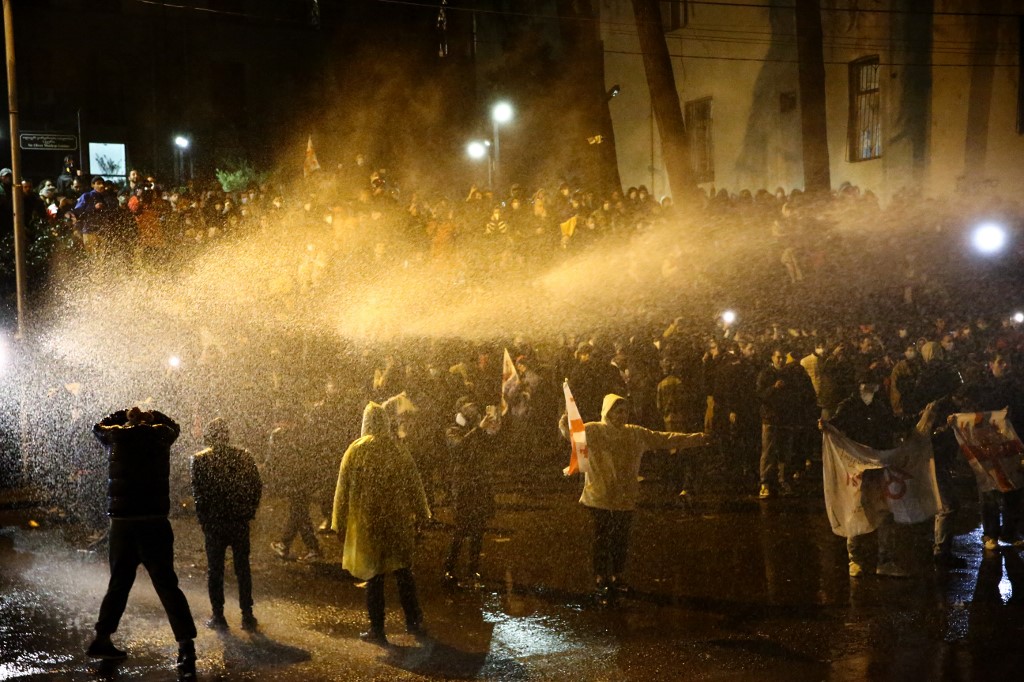Wrapped in Georgian, Ukrainian and European flags, people gathered on March 7 and 8 in front of the parliament, in Tbilisi’s Rustaveli Avenue, to oppose the approval of what has been already defined “the Russian law.”
However, on Thursday morning the government was reported to be withdrawing the draft law from the parliament to forestall further protests in the capital.
JOIN US ON TELEGRAM
Follow our coverage of the war on the @Kyivpost_official.
 AFP
AFP
The bill envisages the fining and, in case of non-compliance, detaining of those who – outside the business sector – receive more than 20 percent of their funds from abroad and fail to register themselves as “foreign agents.” To ensure the enforcement of the registration, the law would allow the judiciary to conduct investigations on anyone they deem suspect.
It is the same Russian law that Moscow first approved in 2012.
After the preliminary approvals by parliamentary committees on March 8, the plenary session finally approved the bill on first reading, ignoring the mounting protests around the building.
 Zurab Tsertsvadze / AFP
Zurab Tsertsvadze / AFP
Already in previous days, brawls and clashes had erupted inside the parliament. Outside the building, Georgian citizens began to gather.
The oppressive atmosphere grew, with rumors of “provocations.”
What is the government trying to do?
The city center has been disseminated with posters depicting the faces of intellectuals and politicians who had expressed their objection to the law. The posters accused them of being “spies” or “against the Church.”

US Threatens to Cut Starlink Access in Ukraine If No Rare Earth Minerals Deal Signed
The government, which supports this law, has tried to leverage two features of Georgian popular sentiment: one, a profound and widespread religious faith; the other, a generally positive attitude toward the “Western” system. According to recent polls, 90 percent of Georgians hold religious belief and 80 percent support a European path for their country.
Irakli Kobakhidze, chairman of the government Georgian Dream party, has referred to opposition politicians – primarily Mikheil Saakashvili, always the object of Kremlin paranoia, even though jailed and sick – as latter-day Bolshevik traitors.
Indeed, public debate in Georgia has reflected on what it means to use the ambiguous word “agent” and how it primarily hints at the idea of a spy, or a traitor.
Yet the Georgians, no matter what the government is counterfactually saying, are simply not buying the narrative of foreign agents undermining their national sovereignty. That is why, after a couple of years of relative quiet, Georgians are resorting to their cherished tradition of mass street protests.
The government said that it wants to “reduce polarization” through this law. Ironically, it has succeeded: all opposition in the country is now united.
Moreover, this unnecessary, unsolicited and unexpected law has also succeeded in bringing those apathetic Georgians who had lost faith in public protests, back to the streets.
The first night, at the peak of the protests, the President of the Georgian Republic, Salome Zourabichvili, who was on an official visit to the U.S., interrupted her work to speak to the Georgian people. With the Statue of Liberty behind her, she addressed the young people on the streets, saying “I am with you, because you represent free Georgia.” As she had vowed to do before, she reiterated that she would veto the law.
Western capitals also sided with the demonstrators. The EU issued a statement deeming the bill “incompatible with European values and standards.” The U.S. State department is ready to “hold anyone accountable.” And the foreign ministers of the Baltic States are asking the Georgian government to abstain from decisions that may undermine Georgia’s European path.
Yesterday, in his daily address, Ukrainian President Volodymyr Zelensky addressed the Georgian people, hailing their struggle for freedom.
It would seem that the Georgian Dream government has de facto lost its legitimacy – having received this clear signal from the people, from the President, and from a number of civil society institutions.
The only support for the bill came from Kremlin spokesperson Maria Zakharova.
What’s next?
Yesterday, former prime Minister Giorgi Gakharia – infamously remembered for the repression of Tbilisi rallies in 2019, when he was the interior minister, which left more than 200 people injured – expressed criticism. He called out to oligarch Bidzina Ivanishvili, founder of Georgian Dream, inviting him to “come out from where he’s hiding” and “explain why he’s selling out Georgian national interest.”
While this statement could certainly being framed as an attempt by Gakharia to exploit the situation politically, he is clearly trying to “feel the pulse” of Georgian politics and its immediate future.
The prospect for the current government is shaky. Support has been faltering within the party itself, as some of its members have openly voiced their opposition to the bill.
Indeed, apart from the Kremlin, virtually nobody inside or outside the country is supporting or legitimizing this government in any way.
That is why the government announced it will withdraw the bill. The hope is to allow the protests lose momentum.
You can also highlight the text and press Ctrl + Enter











